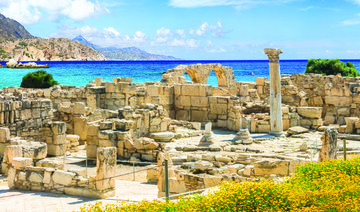RIYADH: The foreign minister of Cyprus has said in an exclusive interview with Arab News that his government’s position is aligned with fellow EU members in supporting the territorial integrity of Ukraine and all countries in the world.
As a country that has a problem with a part of its own territory occupied, Cyprus could not be expected to have a different stance, Ioannis Kasoulides said on Tuesday, referring to the breakaway statelet of Northern Cyprus, which is recognized only by Turkey.
“Cyprus stands together with the other members of the EU in unison. Imagine Cyprus, which has a problem with part of its country occupied, having a different stance from one of support for the territorial integrity of countries,” he said.
Alluding to a landmark agreement that addressed a range of global issues signed in 1975 by 35 countries in Finland’s capital, Helsinki, Kasoulides said: “We are in favor of the Helsinki Accords, which means the inviolability of borders and no settling of disputes through military means.”
Like many other countries, Cyprus has been put on the spot by the Ukraine conflict since it maintains close relations with both Russia and Ukraine.
The Mediterranean country has a population of 1.22 million. Its main industry is tourism, accounting for about 18 percent of its economy. Both Russia and Ukraine are major contributors to its tourism revenues.

Foreign Minister Ioannis Kasoulides speaking to Arab News assistant editor-in-chief Noor Nugali in Riyadh on Tuesday. (AN Photo/Huda Bashatah)
More than 780,000 Russian tourists visited Cyprus in 2019 before the COVID-19 pandemic struck, out of a total of some 3.9 million. More than 95,000 Ukrainian arrivals were registered in the same year.
“We have good relations with Russia, in the financial sector, and a lot of (Russian) tourists visit Cyprus,” Kasoulides said.
“We would like to have preserved this good relationship, but when it comes to principles, values and the unity of the EU, I’m afraid that’s what prevails.”
The interview with Foreign Minister Kasoulides was conducted after he met with Saudi Arabia’s Crown Prince Mohammed bin Salman and Minister of State for Foreign Affairs Adel Al-Jubeir.
On Tuesday, the crown prince hosted the president of Cyprus, Nicos Anastasiades, at the Al-Yamamah Palace in Riyadh.
READ MORE
Saudi Arabia’s Crown Prince Mohammed bin Salman hosted the president of Cyprus at the Al-Yamamah Palace in Riyadh. Read more here.
After a welcoming ceremony, the crown prince and President Anastasiades discussed relations and cooperation between the two countries, and reviewed efforts to enhance joint coordination in various fields, as well as regional and international issues of common interest.
Anastasiades’s landmark visit is testament to the solid footing of Saudi-Cyprus bilateral ties since the establishment of diplomatic relations. They have intensified the strategic nature of their partnership as well as strengthened their political, trade and socioeconomic links. Just last month, a Saudi delegation led by Foreign Minister Prince Faisal bin Farhan visited Cyprus’ capital, Nicosia, as the first guests of Kasoulides after his assumption of duties.
“First of all, let me say that we have come here as the beginning of the new stage of relations,” Kasoulides said. “We have had good relations for five years now. We are changing gear now to a much faster, more organized, more targeted relations.
“We have announced publicly our support for the Expo 2030 bid of Saudi Arabia,” he said, adding that joint efforts to this end will now be within the framework of the strategic partnership, in line with Vision 2030.
Speaking of the Gulf Cooperation Council as a whole, Kasoulides said: “We have excellent relations with all the GCC countries and we are grateful that looking at a small country like ours, they look at a friend and somebody who can contribute, in any way possible.”

Foreign Minister Kasoulides spoke about a range of issues, including the ongoing situation in Ukraine, attacks on the Kingdom by the Houthis and Cyprus’ relations with Turkey. (AN Photo/Huda Bashatah)
Cyprus is among the many countries that have voiced concern over recent attacks aimed at disrupting the stability and security of the Gulf region. It has expressed strong solidarity with the government and people of Saudi Arabia and categorically condemned drone strikes by Iran-backed Houthis on civilian facilities.
“We have condemned unreservedly the terrorist attacks by the Houthis,” he said. “We have raised the issue within the EU, with the aim to see one day the EU declare the Houthis a terrorist organization.
“Certain member states are hesitant to do this, claiming that in order to provide humanitarian aid to Yemenis, they cannot at the same time declare (the Houthis) terrorists because they will not be able to have relations with (the Houthis). I don’t agree with this assertion. Let’s hope that this will be done in the near future.”
During their meeting in Nicosia, Kasoulides had briefed Prince Faisal bin Farhan on the latest developments on the Cyprus issue. He had described the confidence-building measures the Anastasiades government intended to propose in order to pave the way for the “resumption of meaningful negotiations for the reunification of Cyprus according to the agreed framework.”
The Cyprus dispute has its origins in the Turkish invasion of the country in 1974 in response to a coup aiming at union with Greece. About 180,000 Greek Cypriots fled Cyprus’ northern third while tens of thousands of Turkish Cypriots settled the north, whose declaration of independence only Turkey recognizes.
Kasoulides touched on the issue again during Tuesday’s interview. “We have always been steady in our policy to resolve the dispute through negotiations and under the UN, based on the resolutions of the UN for the creation of a bi-communal, bi-zonal federation,” he said.
“I am afraid that this is what Turkey does not want now. We have nothing else but to persist through international legality, through the resolutions of the UN, through the framework of the (relevant) Security Council resolutions, to achieve this.”














